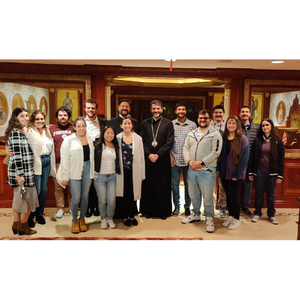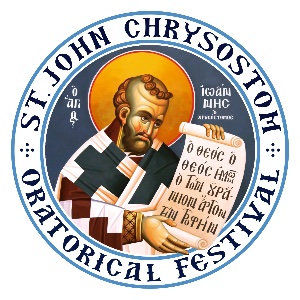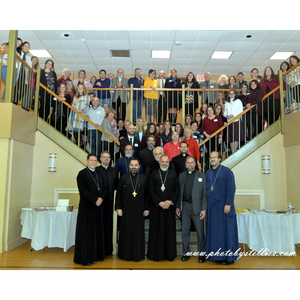Church School: we are planning to resume our Sunday School on Sunday, December 4. Unfortunately, our youth educational programming has been dormant since the start of the COVID pandemic in 2020. Initially, we hope to offer religious education on the first Sunday of each month - God-willing, we will expand back to our pre-COVID offering of weekly Church School. After many years of blessed service, our Religious Education Director, Georgia Maheras, has stepped aside; so we will need a few volunteers to get everything running. If you are interested in helping with this vital and needed ministry, please contact Fr Andreas as soon as possible for further details and for compliance with the Archdiocesan Youth Safety protocols.
Parish Assembly: we will hold the Fall Parish Assembly, as mandated by the Archdiocesan Regulations, next Sunday, November 13, following the Divine Liturgy. At this assembly, the Parish Council will propose a budget for 2023, and nominations will be offered for various parish elected bodies. All parishioners who are in good-standing (stewards) are eligible to vote, speak and participate at an Assembly, as well as vote in Parish Council elections. At the discretion of the Assembly Chairman, non-stewards may attend the Assembly. Following is information from the Regulations about parishioner status:
ARTICLE 18 – PARISHIONERS
§ 1: Every person who is baptized and chrismated according to the rites of the Orthodox Church is a parishioner. The religious, moral and social duties of a parishioner are to apply the tenets of the Orthodox Faith to his/her life and to: adhere to and live according to the tenets of the Orthodox faith; faithfully attend the Divine Liturgy and other worship services; participate regularly in the holy sacraments; respect all ecclesiastical authority and all governing bodies of the Church; be obedient in matters of the Faith, practice and ecclesiastical order; contribute towards the progress of the Church's sacred mission; and be an effective witness and example of the Orthodox Faith and Traditions to all people. A parishioner in good standing practices all the religious and moral duties as described in this Section 1. At a minimum, a parishioner in good standing must: be eighteen years of age or over; be current in his or her stewardship and other financial obligations to the Parish, abide by all the regulations herein stated and the Parish Bylaws; and cooperate in every way towards the welfare and well-being of the Parish. (Stewardship is recommended to be ten percent (10%) of one’s annual income as stated in Holy Scripture to help meet the financial obligations of the Parish, the Metropolis and the Archdiocese.)
§ 2: Any person wishing to be a parishioner in good standing in more than one Parish must remit his or her Stewardship financial obligation to each Parish as stated in Section 1 of this Article. A parishioner wishing to move from one Parish to another must present a letter of transfer from the Priest of the Parish from which he or she is moving stating that he or she is in good standing.
§ 3: No person shall be deemed a parishioner in good standing while: not adhering to the standards outlined in Sections 1 and 2 of this Article; retaining affiliation in an Orthodox Parish which defies the jurisdiction or the ecclesiastical authority of the Archdiocese; being a member of or practicing a non-Orthodox faith or other religion; and deliberately disregarding and transgressing the moral law of the Church.
§ 4: The Priest shall judge any cases of special circumstances justifying the waiver of a parishioner's stewardship financial obligations.
§ 5: A parishioner in good standing has the right to attend, participate and vote at Parish Assemblies, as well as to vote in Parish Council elections. Each such parishioner may also be nominated for election to the Parish Council or to represent the Parish at a Local Assembly or the Congress.
§ 6: An Orthodox Christian parishioner in good standing at his or her canonical Orthodox Parish may serve as a sponsor in another Parish without being obliged to become a member in good standing at the Parish where the sacrament will take place. A parishioner may serve as a sponsor in another Parish by presenting a letter of good standing from his or her home Parish Priest.
Philoptochos News:
1) JUMP has communicated a need for Diapers. To meet this need, Philoptochos invites all members of our community to bring a bag of diapers of any size to the church hall on Sundays, November 6 and 13. Thank you and God bless you.
2) Note the following change in the Philoptochos Meeting date. Because of the General Assembly meeting on November 13, the Philoptochos meeting will be moved to Sunday, November 20, 3:30 p.m. The Zoom link will be e-mailed to members. If you would like to join us, please contact Presvytera Anthe at prezanthe@aol.com!

For information about current events and calendar, please go here on the parish website.







 With the blessing of His Eminence Archbishop Elpidophoros of America, on Thursday, November 3, 2022, Young Adults from the Northern New Jersey area gathered together at the Metropolis of New Jersey headquarters in Westfield, NJ for an evening of fellowship and for the formation of a regional YAL Board.
With the blessing of His Eminence Archbishop Elpidophoros of America, on Thursday, November 3, 2022, Young Adults from the Northern New Jersey area gathered together at the Metropolis of New Jersey headquarters in Westfield, NJ for an evening of fellowship and for the formation of a regional YAL Board.
 The Department of Religious Education (DRE) is pleased to announce the release of the 2023 St. John Chrysostom Oratorical Festival Topic Tips & Resources. Formerly known as ‘Topic Tips’ just for the youth participants, this year, the DRE has expanded it to ‘Topic Tips & Resources’ for participants, parents, mentors, GOYA advisors, and religious educators.
The Department of Religious Education (DRE) is pleased to announce the release of the 2023 St. John Chrysostom Oratorical Festival Topic Tips & Resources. Formerly known as ‘Topic Tips’ just for the youth participants, this year, the DRE has expanded it to ‘Topic Tips & Resources’ for participants, parents, mentors, GOYA advisors, and religious educators.
 With the blessing of Archbishop Elpidophoros of America, the Metropolis of New Jersey Delaware Valley Youth Commission hosted its annual Religious Education Seminar at Holy Trinity Greek Orthodox Church in Wilmington, Delaware, on Saturday, October 29, 2022.
With the blessing of Archbishop Elpidophoros of America, the Metropolis of New Jersey Delaware Valley Youth Commission hosted its annual Religious Education Seminar at Holy Trinity Greek Orthodox Church in Wilmington, Delaware, on Saturday, October 29, 2022.